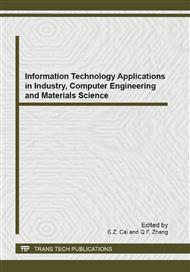[1]
Gerard P. Cachon, Supply chain coordination with contracts, in Graves S, De Kok T. The handbook of operations research and management science: supply chain management, Elsevier, Amsterdam: North Holland, 2003, pp.229-339.
DOI: 10.1016/s0927-0507(03)11006-7
Google Scholar
[2]
H. Emmons, S. Gilbert, Return policies in pricing and inventory decisions for catalogue goods, Management Science, Vol. 44, No. 2, pp.276-283, (1998).
DOI: 10.1287/mnsc.44.2.276
Google Scholar
[3]
V. Padmanabhan, I.P.L. Png, Manufacturer's return policy and retail competition, Marketing Science, Vol. 16, No. 1, pp.81-94, (1997).
DOI: 10.1287/mksc.16.1.81
Google Scholar
[4]
H. Wang, W. Wang and K. Kobaccy, Analysis and design of returns policies from a supplier's perspective, Journal of the Operational Research Society, Vol. 58, pp.391-401, (2007).
DOI: 10.1057/palgrave.jors.2602157
Google Scholar
[5]
S. Webster, Z. K. Weng, Risk-free perishable item returns policy, Manufacturing and Service Operations Management, Vol. 2, No. 1, pp.100-106, (2000).
DOI: 10.1287/msom.2.1.100.23270
Google Scholar
[6]
Z. Yao, S. C H. Leung and K. K. Lai, Analysis of the impact of price-sensitivity factors on the returns policy in coordinating supply chain, European Journal of Operational Research, Vol. 187, pp.275-282, (2008).
DOI: 10.1016/j.ejor.2007.03.025
Google Scholar
[7]
Zhigang Zhao, Xiangyang Li and Xiuzhi Liu, On response method for buyback contract with fuzzy random demand updating, Chinese Journa1 of Management Science, Vol. 15, No. 3, pp.47-55, 2007. (in Chinese).
DOI: 10.1109/fuzzy.2006.1681913
Google Scholar
[8]
Haijun Liu, Juhong Chen, Supply chain fuzzy buyback contract based on context of unrepairable defect, Control and decision, Vol. 25, No. 8, pp.1155-1158, 1163, 2010. (in Chinese).
Google Scholar
[9]
Baoding Liu, Uncertain Theory: an Introduction to Its Axiomatic Foundations, Berlin, Germany: Springer-Verlag, (2004).
Google Scholar
[10]
Xiaobin Wang, Xiaohui Wang, Supply chain coordination based on buy back contract with fuzzy demand, In Proceedings of the 8th International Conference on Machine Learning and Cybernetics, 2009,pp.839-843.
DOI: 10.1109/icmlc.2009.5212359
Google Scholar
[11]
Shengju Sang, Qiang Zhang and Jianzhang Wu, Coordination mechanism analysis for supply chain with fuzzy demand, Computer Integrated Manufacturing Systems, Vol. 16. No. 2, pp.357-379, 2010. (in Chinese).
Google Scholar
[12]
Junyan Wang, Wansheng Tang and Ruiqing Zhao, Supply chain coordination by revenue-sharing contract with fuzzy demand, Journal of Intelligent and Fuzzy Systems, Vol. 19, No. 6, pp.409-420, (2008).
Google Scholar


